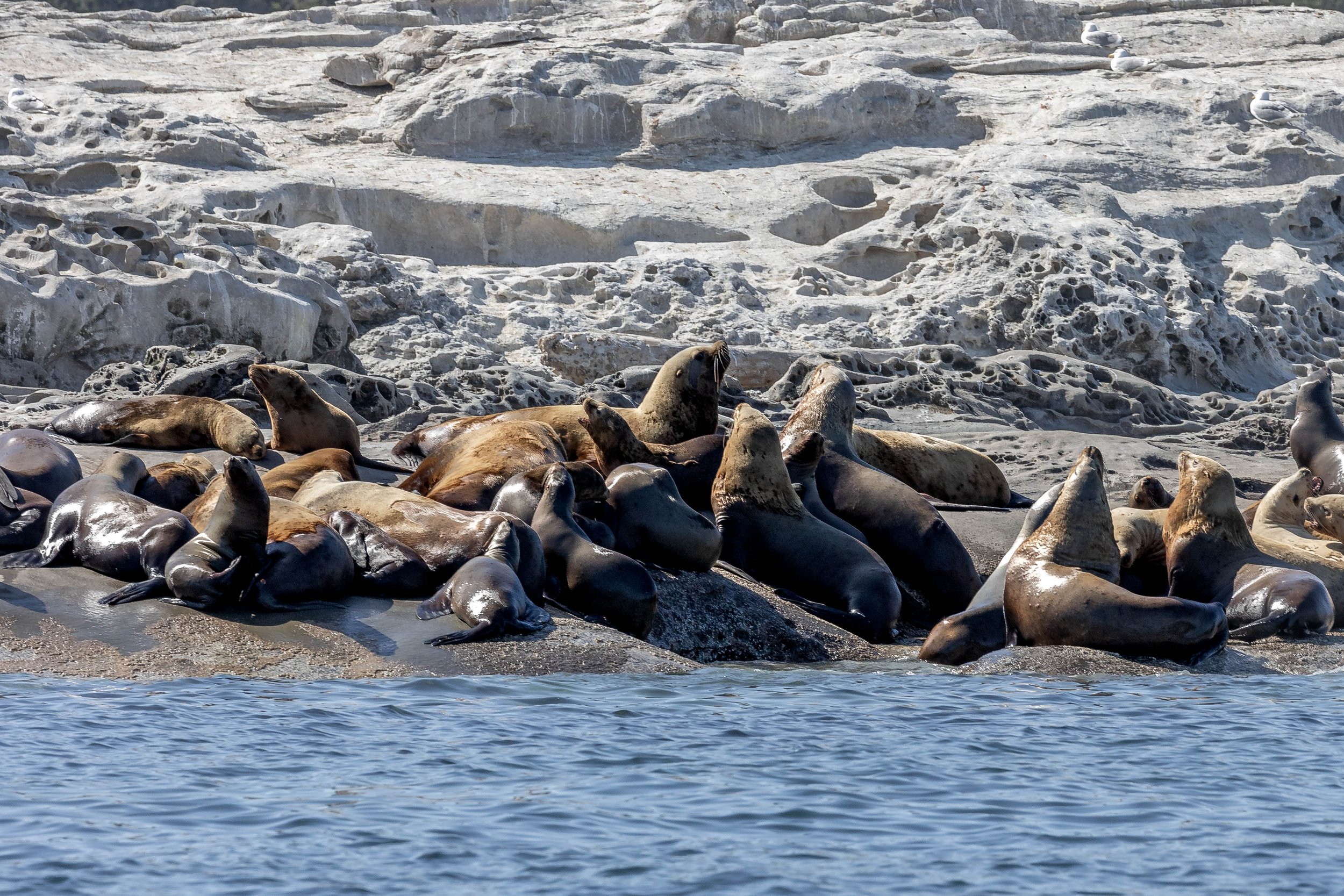April 19, 2024 - A day with Mustelids and Pinnipeds
Today’s wildlife sightings started very early. Before we even pushed off the dock, there was a pair of river otters spotted in the waters below our office space mating. None of our staff have ever witnessed this before so this was an exciting opportunity for us as well! Marine Naturalist Val Watson captured some photos as well as a video showcasing the behaviour which we have linked below.
Drying off on the dock. Photo by Val Watson.
Can you spot the female under the water? Photo by Val Watson.
Toe beans! Photo by Val Watson.
We know it can be confusing seeing that we have River otters in our ocean waters, but did you know that Sea otters are still considered extirpated from our area? Extirpation, also known as local extinction, occurs when a species is completely wiped out from an area. Sea otters were considered extirpated from British Columbia by the early 1900s due to the fur trade industry. During the late 1960s, they were reintroduced and their populations have slowly been increasing since. There have been a couple of sightings of Sea otters in the waters of Southern Vancouver Island, but most populations are still restricted to the West coast of the island. Ollie the Otter, a famous male otter who calls Race Rocks in Victoria his home, is the most famous otter in our area.
After the exciting start to the day, we were eager to head out. Once we departed the dock we turned into the Strait of Georgia, or the big body of water that separates the mainland of BC from Vancouver Island. Conditions were perfect today with nearly glass-like conditions and the sun was shining. We began our search pointing towards Halibut Bank. We cruised along, scanning all around, but unfortunately discovered nothing here. After that, we turned south and started making our way down the island. We caught word of a Humpback sighting in Active Pass and we were eager to go see it! We travelled down the edge of the Strait in a straight line for Active Pass. Once we were closing in, there it was - 2 big blows and then a giant fluke raised into the air! Typically when a Humpback flukes (raises it tail in the air) it means it is going down for a bit of a deeper dive, so we got comfy and waited…and waited…and waited. We continued scanning in search of our elusive humpback, but unfortunately were never able to locate it again. You would think it would be hard to lose a 15m./50 ft. long whale, but because our whales are free of trackers and tags, it can sometimes occur as it did today.
Once we left scene we popped into Active Pass. We had a quick stop to see some sleepy Harbour seals inside the pass before we once again entered search mode. We scanned and scanned as we headed north before we popped out of Porlier Pass and into the Strait of Georgia once more. Theoretically, if our Humpback had continued travelling north, it could now have been near this pass. We looked around as we popped over for another wildlife stop at Canoe Islets.
The Canoe Islets were bustling with activity. A large raft of California sea lions was bobbing along, barking and watching us curiously. A couple of them became excited and started porpoising, or jumping out of the water as they swam along. Up on dry land, there were a number of Steller sea lions grumbling away. At first, it seemed like it would be all bark and no bite, until suddenly one of the large males bared his teeth and lunged at a smaller one. This is very typical behaviour as our sea lions compete for the best spots on land to rest. After observing our sea lions we headed back into the Southern Gulf Islands and continued our journey north.
After heading north we crossed through Dodd Narrows for one final stop. We popped over to the Gabriola Bluffs to see our cormorant rookery. These long-necked black birds nestle into all the tiny crevices in the rocks to lay their eggs and raise their babies. We stopped to see them and the magnificent rock formations at the Bluffs before turning and making our way back to home port.
Unfortunately, the whales eluded us today - but all our guests received vouchers to join us for another trip at their leisure.
Tour photos taken by Marine Naturalist Cheyenne Brewster.
A bob of sleepy Harbour seals. Photo by Cheyenne Brewster.
Harbour seals, also lovingly known as Rock Sausages, love to hang out on rocky shorelines. Photo by Cheyenne Brewster.
Wondering what we are doing! Photo by Cheyenne Brewster.
A curious large male Steller sea lion peeking at us. Photo by Cheyenne Brewster.
Canoe Islets’ coastline was full of grumbling pinnipeds. Photo by Cheyenne Brewster.
There were many large male Steller sea lions at the Canoe Islets today. Photo by Cheyenne Brewster.
A raft of sea lions. Photo by Cheyenne Brewster.
So many sea lions! Photo by Cheyenne Brewster.
A pair of Bald Eagles. Photo by Cheyenne Brewster.
Our Cormorants are busily getting ready for nesting season. Photo by Cheyenne Brewster.
One of the intricately eroded areas of the Bluffs. Photo by Cheyenne Brewster.
The end of the Gabriola Bluffs. Photo by Cheyenne Brewster.















